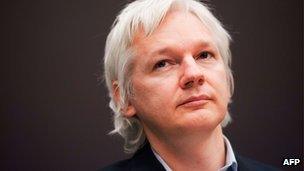Ecuador and UK impasse over Julian Assange's asylum
- Published

Assange is wanted for questioning in Sweden over allegations of rape and sexual assault
A year has passed since Julian Assange sought refuge in Ecuador's embassy in London.
While the Wikileaks founder has not gone beyond the balcony at the embassy's Knightsbridge headquarters, much movement has been going on behind the scenes.
Ecuador's Foreign Affairs Minister Ricardo Patino announced last week that Ana Alban, Ecuador's ambassador to the UK, would leave her post.
In a BBC interview, Mr Patino said Ms Alban had asked to be replaced before the Ecuadorean government decided to grant Mr Assange asylum. He said her replacement was not a result of the Assange case.
But foreign ministry sources in Quito told BBC News that various high-ranking officials had repeatedly expressed profound dissatisfaction over her work.
They say Ms Alban was seen as "ill-suited for her position" and was considered unable to bring an end to the long-running diplomatic impasse.
Wanted for questioning
Some observers argued that Ms Alban's replacement may also mean a shift in Ecuador's strategy in the Assange saga.
Mr Assange entered Ecuador's embassy in London last June asking for asylum.
He did so to avoid extradition to Sweden, where prosecutors want to question him over allegations of rape and sexual assault.
The Australian anti-secrecy campaigner, who denies wrongdoing, fears that if he is sent to Sweden, he may be extradited to the US, where he could face the death penalty for disclosing confidential government information.
His decision to seek refuge in Ecuador's embassy caught many international observers by surprise, raising questions about why the Andean country would be interested in protecting him.
Sources told the BBC negotiations had been ongoing for months and that Ecuadorean authorities in London already knew Mr Assange would soon become their guest.
Yet, it took the Ecuadorean government two months to make its position official.
On 16 August, Mr Patino announced Mr Assange would be granted asylum.
This meant that Mr Assange would avoid British arrest and deportation to Sweden if he stayed in the Ecuadorean embassy. Any attempt to leave would result in his arrest.
Limited experience
While the Assange case gave Ecuador a high profile, it also put the country in a delicate diplomatic position.
So far Ecuador has tried to negotiate safe conduct with the UK government so Mr Assange can leave the embassy without being arrested. But the UK insists it is legally obliged to extradite Mr Assange to Sweden.
"This is a complex case in which the reputations of many countries are at stake," said Michel Levi, a foreign policy analyst at Quito's Simon Bolivar Andina University.
"Such a case required a more experienced diplomatic representation that could co-ordinate the situation better."
Ms Alban was named ambassador to London in 2010, when the UK was seen as marginal for Ecuador's foreign relations.
Some US cables dating back to 2007, when President Rafael Correa took over and appointed Ms Alban as environment minister, suggest she was not an experienced political operator.
"Alban, who was appointed by previous President Alfred Palacio in 2005, was retained by President Correa. Although seemingly well-intentioned, she has been a weak and ineffectual minister under both Palacio and Correa," said a cable originating from the US embassy in Quito on 17 September 2007, external.
Ecuador's relations with Mr Assange have had ups and downs since his Wikileaks website first released US state department diplomatic cables in November 2010.
At the time, deputy Foreign Minister Kintto Lucas said Ecuador would grant him residency if needed. A few weeks later, Mr Patino and President Correa backtracked, saying Mr Lucas had spoken "on his own behalf".
Warming to Wikileaks
Mr Correa spoke disparagingly of Wikileaks, saying it had "committed an error by breaking the laws of the United States and leaking this type of information."
But things changed in 2011, when the Ecuadorean government reached an agreement with Mr Assange to declassify all the cables from the US Embassy in Quito.
Wikileaks had previously released the cables through El Comercio and El Universo, two opposition newspapers which Mr Correa thought were using them to further their own anti-government agenda.
Sources told BBC News that Fidel Narvaez, Ecuador's consul to London, was the mastermind behind the Wikileaks-Ecuador episode.
Mr Narvaez, a political activist who was made consul in 2010, is thought to have approached Mr Assange about the US cables.
He also mediated an interview between the Wikileaks founder and President Correa in April 2012.
Exit strategy
The 75-minute interview, broadcast on Russia Today, an English-language TV channel funded by the Moscow government, was a bonding moment for Mr Assange and the Ecuadorean president, who praised Wikileaks and its work.
Mr Assange's arrival at the embassy was no surprise for those at the foreign affairs ministry who already knew of Mr Narvaez's negotiations with Mr Assange.
At the same time Mr Narvaez, who is seen with suspicion by career diplomats for his radical politics, hoped to find fertile terrain in Mr Patino's hard line in foreign affairs.
Last week Mr Patino announced the new ambassador would be Juan Falconi Puig, a lawyer criticised for his role in protecting private banks during the collapse of Ecuador's financial system in the late 1990s.
With both the UK and Ecuador holding fast to their positions, it is difficult to see how there could be a quick exit strategy for Mr Assange.
The answer may yet lie within the walls of the embassy in which the Wikileaks founder is currently confined.
- Published16 June 2013
- Published7 June 2013
- Published8 April 2013